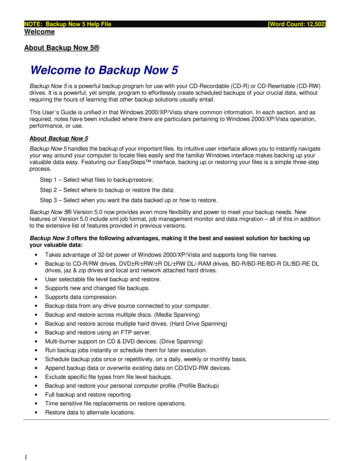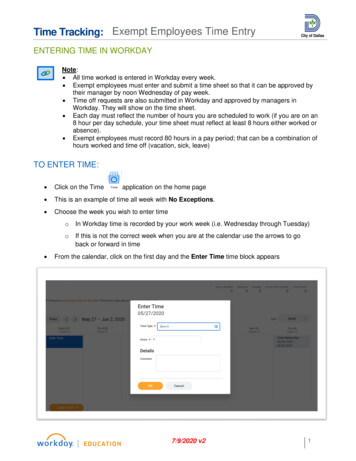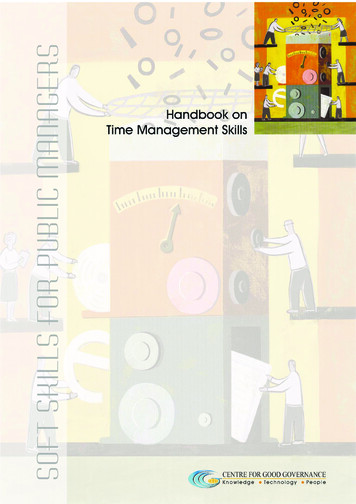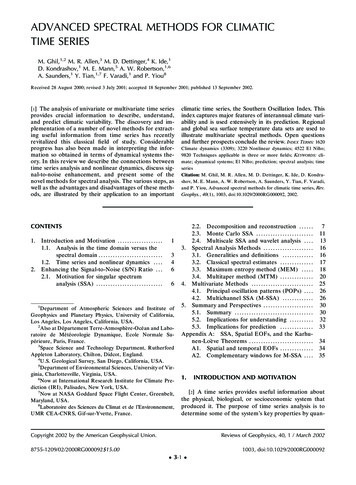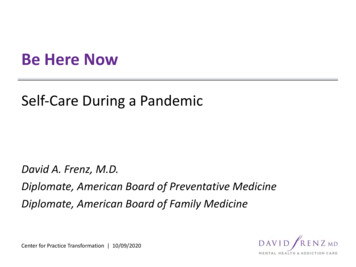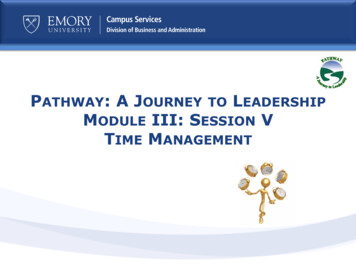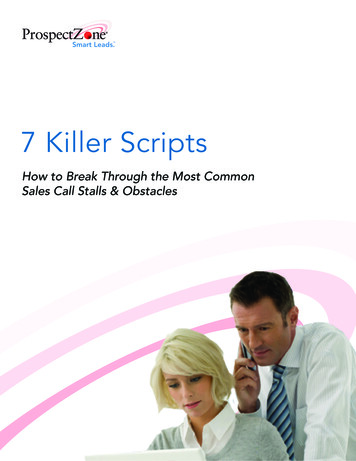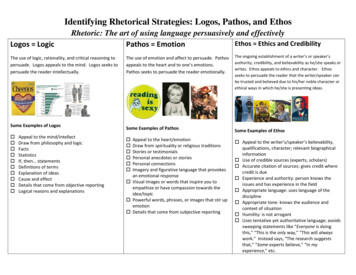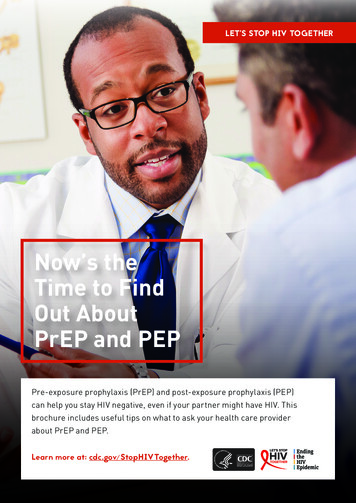
Transcription
LET’S STOP HIV TOGETHERNow’s theTime to FindOut AboutPrEP and PEPPre-exposure prophylaxis (PrEP) and post-exposure prophylaxis (PEP)can help you stay HIV negative, even if your partner might have HIV. Thisbrochure includes useful tips on what to ask your health care providerabout PrEP and PEP.Learn more at: cdc.gov/StopHIVTogether.
PrEP: Prevent HIV Before ExposureWhat Is PrEP?PrEP (pre-exposure prophylaxis) is medicine people at risk for HIV take toprevent getting HIV from sex or injection drug use.1PREP AND PEP
How Effective Is PrEP?PrEP is highly effective for preventing HIV. It greatly reduces the risk ofgetting HIV from sex when taken as prescribed. Although there is less information about how effective PrEP is amongpeople who inject drugs, we do know that PrEP lowers the risk of gettingHIV when taken as prescribed. PrEP is much less effective when it is not taken as prescribed.INFORMATION FOR PATIENTS2
Is PrEP Right for Me?PrEP may be right for you if you test negative for HIV and if any of thefollowing apply to you:If you have had anal orvaginal sex in thepast 6 monthsand you have a sexual partner with HIV(especially if the partner has anunknown or detectable viral load),have not consistently used a condom,orhave been diagnosed with a sexuallytransmitted disease (STD) in the past6 months.inject drugshave an injection partner with HIV, orshare needles, syringes, or otherequipment to inject drugs (forexample, cookers).have beenprescribed PEP(post-exposureprophylaxis)report continued risk behavior, or haveused multiple courses of PEP.If you have a partner with HIV and are considering getting pregnant, talkto your health care provider about PrEP if you are not already taking it.PrEP may be an option to help protect you and your baby from getting HIVwhile you try to get pregnant, during pregnancy, or while breastfeeding.3PREP AND PEP
Can Young People Take PrEP?Yes. PrEP is approved for use by adolescents without HIV who weigh atleast 77 pounds (35 kilograms) and who are at risk for getting HIV fromsex or injection drug use (see Is PrEP Right for Me?).How Can I Start PrEP?Talk to your health care provider if you think PrEP may be right for you.PrEP can be prescribed only by a health care provider. Before beginning PrEP, you must take an HIV test to make sure you donot have HIV. While taking PrEP, you will have to visit your health care provider every3 months for:— Follow-up visits.— HIV tests.— Prescription refills.INFORMATION FOR PATIENTS4
Are There Different Types of PrEP?Two medications are approved for use as PrEP: Truvada and Descovy . Truvada (or generic equivalent) is for all people at risk through sex orinjection drug use. Descovy is for people at risk through sex, except for people assignedfemale at birth who are at risk of getting HIV from vaginal sex.Is PrEP Safe? PrEP is safe, but some people experience side effects like diarrhea,nausea, headache, fatigue, and stomach pain. These side effects usuallygo away over time. Tell your health care provider about any side effects that are severe ordo not go away.5PREP AND PEP
Will PrEP Interfere With My Hormone Therapy? There are no known drug conflicts between PrEP and hormone therapy,and there is no reason why the drugs cannot be taken at the same time.What if I Need to Stop Taking PrEP?There are several reasons why people stop taking PrEP: Your risk of getting HIV becomes low because of changes in your life. You don’t want to take a pill as prescribed or often forget to take yourpills. You have side effects from the medicine that interfere with your life. Blood tests show that your body is reacting to PrEP in unsafe ways.Talk to your health care provider about other HIV prevention methods thatmay work better for you.INFORMATION FOR PATIENTS6
If I Stopped Taking PrEP, How Do I Start Taking It Again?Tell your health care provider that you would like to start taking PrEPagain. You will need to take an HIV test before you start PrEP to make sureyou don’t have HIV.Can I Take PrEP Just Once, if I Think I Might Have RecentlyBeen Exposed to HIV? PrEP is for people who are at ongoing risk for HIV. PrEP is not the right choice for people who may have been exposed toHIV in the last 72 hours. If you may have been exposed to HIV in the last 72 hours, talk to yourhealth care provider, an emergency room doctor, or an urgent careprovider about PEP.7PREP AND PEP
Can I Stop Using Condoms if I Take PrEP? PrEP provides protection from HIV but does not protect against otherSTDs. Condoms can help prevent other STDs that can be transmitted throughgenital fluids, such as gonorrhea and chlamydia. Condoms are less effective at preventing STDs that can be transmittedthrough sores or cuts on the skin, like human papillomavirus, genitalherpes, and syphilis.INFORMATION FOR PATIENTS8
How Can I Pay for PrEP?Most insurance plans and state Medicaid programs cover PrEP. There arealso other programs that provide PrEP for free or at a reduced cost: Ready, Set, PrEP makes PrEP medication available at no cost to thosewho qualify, regardless of income. Visit: readysetprep.hiv.gov tolearn more. Co-pay assistance programs help lower the costs of PrEP medications.Income is not a factor in eligibility. Visit: gileadadvancingaccess.com ortevahivgenerics.com to learn more. A manufacturer’s medication assistance program covers the cost ofPrEP medication with income guidelines. Visit:gileadadvancingaccess.com to learn more. Some states have PrEP assistance programs. Some cover medication,some cover clinical visits and lab costs, and some cover both. e-programsto learn more.9PREP AND PEP
Talking to Your Health Care Provider AboutPrEP and PEPHow Do I Talk to My Health Care Provider AboutPrEP or PEP?During Your Visit Be clear. Tell your provider that you are interested in PrEP (or PEP)right away. Give your provider all the details about your life that could be importantto your health. If your sex life is a hard topic to talk about, say that toyour provider. It will help to start the conversation. Tell your provider about your routine, especially things that might makeit easy or hard to take a daily medication. Include your health history. This includes any past illnesses or concernsyou have, as well as a list of your current medications (includingsupplements, herbs, etc.). Ask questions. You want to be sure that you understand what yourprovider is telling you. Take notes during your visit so that you can remember what yourprovider said.After Your Visit Review your notes and any information from your health care provider. Call your provider if you have more questions. Schedule tests or follow-up appointments your provider requested. Get your results if you had tests done at your appointment. Get treated if you have an STD. Be sure to keep your prescription filled and take your medicineas prescribed.INFORMATION FOR PATIENTS10
PEP: Prevent HIV After ExposureWhat Is PEP?PEP stands for post-exposure prophylaxis. It means taking antiretroviralmedicines after being potentially exposed to HIV to prevent becominginfected.PEP must be started within 72 hours after a recent possible exposure toHIV, but the sooner you start PEP, the better. Every hour counts. If you’represcribed PEP, you’ll need to take it once or twice daily for 28 days. PEPis effective in preventing HIV when administered correctly, but not 100%.11PREP AND PEP
Is PEP Right for Me?Talk to your health care provider or an emergency room doctor about PEPright away if you are HIV negative or do not know your HIV status, and inthe last 72 hours, you:1.Think you may have been exposed to HIV during sex (for example, if thecondom broke).2.Shared needles and works to prepare drugs (for example, cotton, cookers,water).3.Were sexually assaulted.PEP should be used only in emergency situations and must be startedwithin 72 hours after a recent possible exposure to HIV. It is not asubstitute for: Regular use of other proven HIV prevention methods, such as PrEP, whichmeans taking HIV medicines regularly to lower your chance of gettinginfected. Using condoms the right way every time you have sex. Using only your own new, sterile needles and works every time you inject.PEP is effective, but not 100%, so you should continue to use condomswith sex partners and safe injection practices while taking PEP. Thesestrategies can protect you from being exposed to HIV again and reducethe chances of transmitting HIV to others if you do become infected whileyou are on PEP.When Should I Take PEP?PEP must be started within 72 hours after a possible exposure. Thesooner you start PEP, the better; every hour counts.Starting PEP as soon as possible after a potential HIV exposure isimportant. Research has shown that PEP has little or no effect inpreventing HIV infection if it is started later than 72 hours after HIVexposure. If you’re prescribed PEP, you’ll need to take it once or twicedaily for 28 days.INFORMATION FOR PATIENTS12
Does PEP Have Any Side Effects?PEP is safe but may cause side effects like nausea in some people. Theseside effects can be treated, aren’t life threatening, and may go away overtime.Where Can I Get PEP?Your health care provider or an emergency room doctor can prescribePEP. Talk to them right away if you think you’ve been exposed to HIV in thelast 72 hours.How Can I Pay for PEP?If you’re prescribed PEP after a sexual assault, you may qualify forpartial or total reimbursement for medicines and clinical care costs. For more information, visit: ovc.ojp.gov/states.If you’re prescribed PEP for another reason and cannot get insurance,your health care provider can apply for free PEP medicines through themedication assistance programs run by PEP manufacturers. To avoid a delay in getting PEP medicine, in many cases, theseapplications can be handled urgently.Can I Take a Round of PEP Every Time I HaveUnprotected Sex?PEP should only be used in emergency situations.PEP is not the right choice for people who may be exposed to HIVfrequently. Because PEP is given after a potential exposure to HIV,multiple drugs and high doses are needed to block infection.13PREP AND PEP
Pre-exposure prophylaxis (PrEP)—not PEP—is for people who are atongoing risk of getting HIV. PrEP is medicine people at risk for HIV takedaily to protect themselves from getting HIV. Speak to your health careprovider about PrEP if you think PrEP might be right for you.Resources Find a health care provider to prescribe PrEP at: preplocator.org. Learn more about how to protect yourself and get information tailoredto meet your needs from the Centers for Disease Control andPrevention’s HIV Risk Reduction Tool. Visit: hivrisk.cdc.gov. For more information, visit: cdc.gov/StopHIVTogether.You can also access this information by callingCDC-INFO at 800-CDC-INFO (800-232-4636).INFORMATION FOR PATIENTS14
LEARN MORE ATCDC.GOV/STOPHIVTOGETHERSome content reused with permission from the New York City Department of HealthPubNo. 300979March 2021
Using condoms the right way every time you have sex. Using only your own new, sterile needles and works every time you inject. PEP is effective, but not 100%, so you should continue to use condoms with sex partners and safe injection practices while taking PEP. These strategies can protect you from being exposed to HIV again and reduce




